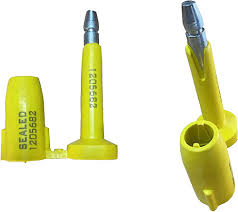Security seals play a critical role in safeguarding the integrity of goods during transportation and storage. They provide a visible and tamper-evident indication of any unauthorized access to containers, trucks, or other forms of packaging. ISO 17712 is an internationally recognized standard that specifies the requirements for mechanical seals used in shipping containers. It primarily focuses on seals designed to deter and detect tampering while ensuring they can withstand various environmental conditions. The question arises: can ISO 17712 certification be obtained for custom-designed security seals? Let’s delve into the intricacies.
Understanding ISO 17712 Certification:
ISO 17712 is a standard developed by the International Organization for Standardization (ISO) to ensure the quality and effectiveness of high-security seals. These seals are commonly used in the international shipping and logistics industry to prevent unauthorized access to containers and to provide evidence of tampering. The standard outlines three main categories of seals: “I,” “S,” and “H,” each representing a different level of security. “I” stands for indicative seals, “S” for security seals, and “H” for high-security seals. High-security seals are subject to the strictest requirements as they are intended to provide the highest level of tamper-evidence and security.
Custom-Designed Security Seals and ISO 17712:
The ISO 17712 standard itself does not explicitly prohibit custom-designed security seals from obtaining certification. However, it does set forth stringent requirements that any seal, including custom-designed ones, must meet in order to be considered compliant. These requirements encompass elements such as material strength, tamper resistance, and durability against environmental factors like moisture, temperature variations, and physical stress.
Challenges in Certifying Custom-Designed Seals:
Obtaining ISO 17712 certification for custom-designed security seals can be challenging due to the inherent complexity. Custom-designed seals vary widely in terms of design, construction, and materials. Unlike off-the-shelf seals that adhere to predefined standards, custom designs require rigorous testing and validation to ensure they meet ISO 17712’s stringent criteria. Additionally, the certification process involves not only the seals themselves but also the entire manufacturing process, quality control, and supply chain management.
Certification Process for Custom-Designed Seals:
For custom-designed security seals to obtain ISO 17712 certification, a comprehensive process must be followed:
- Design and Development: The first step is to design a seal that aligns with the security requirements of ISO 17712. This involves creating a tamper-evident mechanism, choosing appropriate materials, and considering the practical aspects of seal application.
- Testing and Validation: Custom-designed seals need to undergo a series of rigorous tests to ensure they meet the requirements for strength, tamper resistance, and durability. These tests may include tensile strength testing, impact resistance testing, exposure to environmental conditions, and more.
- Manufacturing Control: The manufacturing process must adhere to strict quality control measures to ensure consistency and reliability across each batch of seals produced. This involves establishing clear procedures, conducting regular audits, and maintaining detailed records.
- Supply Chain Management: ISO 17712 certification extends beyond the seal itself. It also involves maintaining the integrity of the entire supply chain to prevent unauthorized access or tampering with the seals before they are applied.
- Certification Application: Once the custom-designed security seals and the associated processes meet the ISO 17712 requirements, the manufacturer can apply for certification. This typically involves submitting detailed documentation, test reports, and other relevant information to a certification body.
- Auditing and Approval: The certification body will conduct thorough audits to verify compliance with ISO 17712. This may include on-site inspections, documentation reviews, and additional testing if necessary.
- Ongoing Compliance: ISO 17712 certification is not a one-time achievement. Manufacturers must demonstrate ongoing adherence to the standard through regular audits and quality control procedures.
Benefits of ISO 17712 Certification for Custom-Designed Seals:
Obtaining ISO 17712 certification for custom-designed security seals can offer several benefits:
- Global Recognition: ISO 17712 certification is recognized internationally, providing a competitive advantage in the global market.
- Enhanced Security: Certified seals enhance the security of goods by deterring tampering and providing reliable evidence if tampering occurs.
- Compliance Assurance: Certification ensures compliance with industry standards and regulations, minimizing risks associated with cargo security.
- Customer Trust: ISO 17712 certification demonstrates a commitment to quality and security, building trust with customers and partners.
Conclusion:
While ISO 17712 certification is achievable for custom-designed security seals, the process is intricate and demanding. Manufacturers must meticulously develop, test, and validate their designs to meet the stringent requirements set by the standard. The certification process covers not only the seals themselves but also the manufacturing processes and supply chain management. Once certified, custom-designed security seals can provide businesses with enhanced security, compliance assurance, and a competitive edge in the global market.












